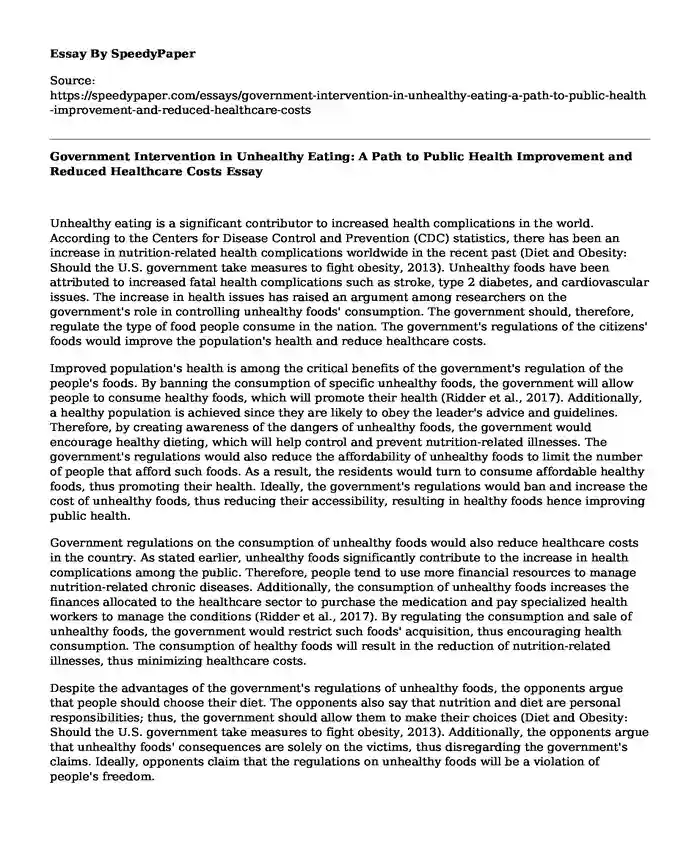
| Type of paper: | Essay |
| Categories: | Government Food Healthcare Diet |
| Pages: | 3 |
| Wordcount: | 585 words |
Unhealthy eating is a significant contributor to increased health complications in the world. According to the Centers for Disease Control and Prevention (CDC) statistics, there has been an increase in nutrition-related health complications worldwide in the recent past (Diet and Obesity: Should the U.S. government take measures to fight obesity, 2013). Unhealthy foods have been attributed to increased fatal health complications such as stroke, type 2 diabetes, and cardiovascular issues. The increase in health issues has raised an argument among researchers on the government's role in controlling unhealthy foods' consumption. The government should, therefore, regulate the type of food people consume in the nation. The government's regulations of the citizens' foods would improve the population's health and reduce healthcare costs.
Improved population's health is among the critical benefits of the government's regulation of the people's foods. By banning the consumption of specific unhealthy foods, the government will allow people to consume healthy foods, which will promote their health (Ridder et al., 2017). Additionally, a healthy population is achieved since they are likely to obey the leader's advice and guidelines. Therefore, by creating awareness of the dangers of unhealthy foods, the government would encourage healthy dieting, which will help control and prevent nutrition-related illnesses. The government's regulations would also reduce the affordability of unhealthy foods to limit the number of people that afford such foods. As a result, the residents would turn to consume affordable healthy foods, thus promoting their health. Ideally, the government's regulations would ban and increase the cost of unhealthy foods, thus reducing their accessibility, resulting in healthy foods hence improving public health.
Government regulations on the consumption of unhealthy foods would also reduce healthcare costs in the country. As stated earlier, unhealthy foods significantly contribute to the increase in health complications among the public. Therefore, people tend to use more financial resources to manage nutrition-related chronic diseases. Additionally, the consumption of unhealthy foods increases the finances allocated to the healthcare sector to purchase the medication and pay specialized health workers to manage the conditions (Ridder et al., 2017). By regulating the consumption and sale of unhealthy foods, the government would restrict such foods' acquisition, thus encouraging health consumption. The consumption of healthy foods will result in the reduction of nutrition-related illnesses, thus minimizing healthcare costs.
Despite the advantages of the government's regulations of unhealthy foods, the opponents argue that people should choose their diet. The opponents also say that nutrition and diet are personal responsibilities; thus, the government should allow them to make their choices (Diet and Obesity: Should the U.S. government take measures to fight obesity, 2013). Additionally, the opponents argue that unhealthy foods' consequences are solely on the victims, thus disregarding the government's claims. Ideally, opponents claim that the regulations on unhealthy foods will be a violation of people's freedom.
Consumption of unhealthy foods poses health risks to the people. Therefore, allowing people to continue consuming unhealthy foods would expose people to fatal conditions that would lead to death. The freedom to consume unhealthy foods would also increase the cost of healthcare. Therefore, the government should regulate unhealthy foods to improve public health and reduce healthcare costs. Ideally, regulating healthy foods would cause more health benefits, thus enabling the government to achieve its public health goal.
References
Diet and Obesity: Should the U.S. government take measures to fight obesity? (2013). Issues & Controversies, Infobase.
Ridder, D., Kroese, F., Evers, C., Adriaanse, M., & Gillebaart, M. (2016). Healthy diet: Health impact, prevalence, correlates, and interventions. Psychology & Health, 32 (8), 907-941. https://www.tandfonline.com/doi/full/10.1080/08870446.2017.1316849
Cite this page
Government Intervention in Unhealthy Eating: A Path to Public Health Improvement and Reduced Healthcare Costs. (2023, Dec 27). Retrieved from https://speedypaper.net/essays/government-intervention-in-unhealthy-eating-a-path-to-public-health-improvement-and-reduced-healthcare-costs
Request Removal
If you are the original author of this essay and no longer wish to have it published on the SpeedyPaper website, please click below to request its removal:
- Free Essay on Law Enforcement and Intelligence Community
- The Case of the Wondering Eyes - Free Essay on Medical Ethics
- Pre-Flexner - Medical Education Essay Sample
- Case Study Paper Example on Body Modification of Maria Jose Cristerna
- Essay Sample on Decontamination Principles
- The Difference Between Counseling and Psychotherapy. Free Essay
- Essay on Culinary Traditions: Unraveling the Symbolism of Chinese Cuisine in Social Dynamics
Popular categories




